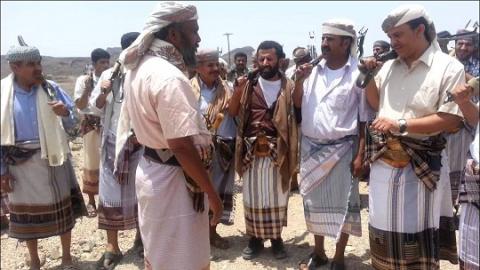A Classroom on a Mini-Bus in Yemen Helps Child Laborers
SANA’A, Yemen—The sound of children laughing can be heard as they repeat the Arabic alphabet. Passersby are looking at the dirty barefoot children and wondering what they are doing in this mini-bus in the Remas area of Sana’a. The children are not on a school trip—they are taking classes on the bus.
The mobile school was started in October, 2013 by the 40-year-old Nazar Al-Saqaf, who works in marketing. Aimed at teaching street children how to read and write, the program started in Remas, which has the reputation of having the highest rates of child labor in Sana’a.
The mobile school offers lessons every Tuesday and Thursday for two hours. Children come to school at 3:00 pm.
Mahiob Ahmed, 7 years old, happily sits in the bus and puts aside his cassette tapes, which he normally sells to drivers on the street. Mahiob tries to write down the alphabet in his copybook, but he is still slow and not accustomed to holding a pencil.
He dreams of being a pilot and looks up at the sky when he hears an airplane. He says “I cannot leave work and attend school like other kids, so I took my father’s permission to attend lessons at the mobile school. He adds that he can barely wait to attend his lessons. “During those two hours I feel like a normal kid who attends school,” he says.
A United Nations study released in 2013 found that 1.3 million Yemini children are working—17 percent of the children between ages five and 17. Children are pressed into service as street vendors, factory workers, auto mechanics, farmers and even soldiers.
In the bus in Sana’a, another child who learns in the bus is warmly welcomed by all other children. Nazar gives him a pencil and a copybook to join his classmates. Tarek Saleh is over 12 years old and the mobile school provided him with his first opportunity to learn.
Tarek cleans cars and he is usually late because of his work. He dreams of being a doctor, and wishes he could enroll in a school and wear a school uniform. He adds “My elder brother did not allow me to attend these classes except after Nazar convinced him of how useful these classes would be to me. I love this place; it protects me from the sun and gives me a break from work.”
As the children sitting in the bus, Nazar moves around them and follows up with each child individually. Teaching each child differs according to his or her ability. But they are all face difficulty in holding their pencils.
Nazar says “Although they are still learning their first alphabet, we feel very optimistic when we see them persisting for months and we are positive that they will pass their first stage of learning how to write. The mobile school is a rehabilitation place that suits working children as it approaches them in the middle of their working place.”
Nazar has taught 45 working children during the last year, most of them boys. Due to their difficult financial circumstances that oblige them to work, most children do not stay too long. Other than Nazar, there are no permanent teachers, since the effort depends mainly on volunteers, who can endure working with children who require patience and special treatment. Many of the children are ill-treated at home or in their workplace, and as a result they can be bad tempered, have mood swings, and use curse words.
Nazar rents the bus for $20 for each two-hour period and says “Children who are determined to learn are still attending our classes. Sometimes we have only one child, but we always receive new children.” Sometimes the children’s parents come and take them out of the bus and send them back to work.
Many people pass by the mobile school and do not hide their curiosity, which upsets the children, especially when people make fun of them and say that teaching them is useless and is a mere waste of time.
Hany Noaman has been a volunteer in the mobile school for four months and says that children stop coming when they hear hurtful comments from passersby. He adds “We are keen on encouraging the children; we give them sweets, coloring books, and crayons. Some people buy them for us, when they know our goals and they praise our work, which is motivating.”
Abdo Ali, 11 years, visits the mobile school since its inception last September. He was also studying in the mobile school during summer.
Abdo says happily “When my family saw that I am a fast learner and that I love to go to the mobile school, they changed their minds and enrolled me in a school. I promised them that I will still work after school.”
The founders of the project dream of owning a big bus, with a board, chairs and tables, so that they can serve a larger number of children and provide them with a better educational environment.
Nazar says “The idea of this mobile school is only a small part of my dream to establish a boarding school for working children. This bus is only the first step and there is still a long way to go.”
On the government level, the Rehabilitation Center for Working Children in Sana’a, established in 2003, is the only official center responsible for school drop-outs. The center has 660 children and undertakes the responsibility of enrolling school drop-outs in 45 public schools, in coordination with the Ministry of Education, to exempt them from any school fees and provide them with school requirements. Suffering from an inadequate budget and insufficient employees (only 16), the center has failed to develop and spread its services.
The idea of a mobile school is not new. It has been applied before in some South Asian countries, such as Nepal, India, and Pakistan.
Mahiob Al-Emry, a UNICEF Educational Expert in the Yemen Office, says that the mobile school needs more resources and volunteers, so that the Ministry of Education would acknowledge it as a school. Then its students would sit for an end-of-year exam and might be promoted to a higher grade.
Al-Emry suggests incorporating working children, street children, marginalized children of African origin and others who have difficulty getting access to education into one of the public schools after coordinating with the Ministry of Education. Of the mobile school, he says “This cannot remain as an individual initiative without any coordination with the authorities or any funding, as it will be subject to termination one day.”
Al-Fanar Media




